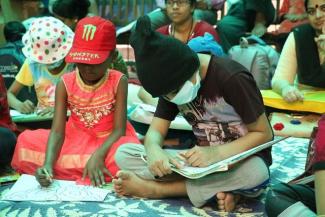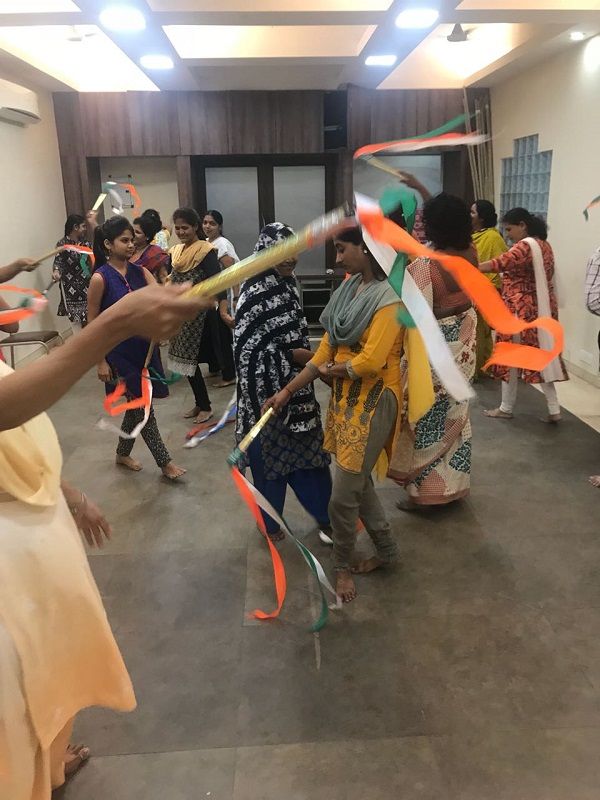
Cancer patients and their families go through stressful, fearful and anxious times of emotional upheaval. Dancer and Actress Kamalika Guha Thakurta talks to PatientsEngage on how Artscape is using art, music and dance therapy to support healing and psychological rehabilitation of cancer patients and their family caregivers.
1. Tell us a little about Artscape.
Artscape is a non-governmental organization established in 2015, which works in the area of mental wellness. We believe that mental wellness is key to an empowered living. We use tools from expressive art therapy such as music, movement, theatre and visual arts, coupled with meditation to design sessions that aim to imbibe positivity, build self-awareness and create well-being.
2. What inspired you to start Artscape?
I have 20 years of experience in performing arts and formal training in Dance Movement Therapy from Tata Institute of Social Sciences (TISS). As an actor, I had many a times attended events at the Tata Memorial Hospital as a guest for various NGOs . This interaction led to a wish to be able to do something more sustainable and valuable for the patients and their families. Since it is in the performing arts that I have trained and worked in, I decided to study, explore and learn about the therapeutic qualities of these forms. These learnings, research and case studies encouraged me to set up Artscape.

3. Why do you believe that mental health should be a priority?
Post diagnosis, most of the focus goes in the physical wellbeing while the mind and emotions remain unaddressed. These suppressed emotions can have far reaching fallouts leading to further trauma, anger bursts, depression, suicidal tendencies, anxiety and pain. Patients and caregivers need a support group to share and a space to vent their feelings, this is where Artscape intervenes.
Read: Photography Lessons For Kids To Fight Cancer in Mumbai
4. Why did you decide to work with cancer patients?
There are huge numbers of patients and their caregivers who come in from villages and small towns to get treated at the Tata Memorial Hospital and other hospitals in and around Mumbai that specialize in cancer care. We wanted to help these multitudes for whom the diagnosis leads to not only physical but also emotional crisis. We believe our sessions teach them coping mechanisms and provides them tools to deal with the situation and their environment.
5. Artscape's Care for Cancer initiative includes different forms of art. What does the therapy entail?
The Care for Cancer Module aims to provide a diversity therapy program complementing the medical treatment to help fasten or ease the process of recovery. Our work focuses on the area of mental wellness and we conduct sessions using Expressive Arts Therapy i.e. music, movement, visual arts, imagery, storytelling etc. in an integrated way to provide emotional aid and foster healing.
We work with trained facilitators who bring in their cumulative experience to design sessions which are specific to a previously set goal/ objective. Our work over the last three years over various settings and population has reaffirmed our belief that a sound and stable mental space is vital for healthy and meaningful living.
6. What are the challenges cancer patients face that you commonly see? How can cancer patients benefit from art therapy?
The Cancer diagnosis and its impact on the physical self is only a fraction of the problem. It is seen that the anxiety, uncertainty and trauma resulting from this diagnosis can create extreme disruption in the physical, psychological, social and financial aspects of the life. This disruption leads to feelings of distress which often remains unaddressed. These suppressed emotions over a long period of time lead to emotional outbursts, anxiety, depression and slow recovery.
Artscape recognizes the dire need to intervene in this area through its Care for Cancer program which helps the cancer patients, survivors and their caregivers to relax by teaching them coping mechanisms that enables them to attain a state of mental well-being.
Read: Soothing Your Body and Soul With Creative Art
7. How is the therapy different for kids with cancer?
The tools and the process we use for the sessions remain same for adults as well as children. But the goals are designed depending on the age group of the beneficiaries. So when it is only children we keep the sessions more entertaining and less in the therapeutic space.
8. Are you planning on working with people with other conditions?
We do have programs for people who are differently abled. Our sessions address their concerns and their difficulties.
Read: From Negative to Positive through Dance Movement Therapy
9. Tell us about your future vision for Artscape?
We want to be able to take the Care for Cancer program to many more beneficiaries than we are currently reaching out to now. We do understand the need to document the emotional need of this population and our Impact on the beneficiaries. We hope with the right documentation and research, we will be able to get validation on the need of such a program and how addressing emotional issues can help the progress of the medical treatment.
Currently we have two more programs Beyond Academics for children from lesser privileged homes and the other is Corporate Wellness, an employee engagement program for corporates.
Kamalika Guha Thakurta has trained intensively in Vocal Music and Classical Odissi Dance. An acclaimed actor, she has been a regular face on Indian Television and Theatre for the last two decades. She is also the Artistic Director of SRIJON, a school in Mumbai dedicated to taking forward the legacy of Rabindranath Tagore. It is this vast knowledge and rich experience that Kamalika now wants to use as a tool to transform lives by using the Arts beyond entertainment.
ARTSCAPE, is a non-governmental organization established in 2015 with a vision to use Expressive Art Therapy as an alternative approach to recovery, healing and psychological rehabilitation of survivors of any kind of trauma – physical or emotional






